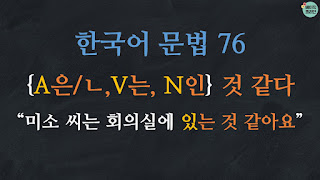Learn Korean | Korean Grammar 135: V-느냐고 하다/냐고 하다 (indirect quotation)
In this lesson, we will look at the expression 'V-느냐고 하다/냐고 하다' used to quote a question sentence that ends with a verb and is the present tense. Let's learn 'indirect quotation' in Korean 'V-느냐고 하다/냐고 하다.'
If you want to watch this lesson in Korean with English subtitles, please click the link below.
⭐️ Korean grammar lesson 135: V-느냐고 하다 (-냐고 하다):
“미소 씨가 나나 씨는 주말에 회사에 가느냐고 물어봤어요.”
1. Short Conversation
미소: 지안 씨, 나나 씨는 주말에 회사에 가요?
⥥⇓
지안: 나나 씨, 미소 씨가 주말에 회사에 가느냐고 물어봤어요.
나나: 네, 이번 주말에는 출근해야 할 것 같아요. 할 일이 많아요.
➔ The grammar we're going to learn today is '가느냐고 물어봤어요.'
(in English)
Miso: Jian, does Nana go to work on the weekend?"
⥥⇓
Jian: Nana, Miso asks me if you're going to work on the weekend.
Nana: Yes, I think I have to go to work this weekend. I have a lot of work to do.
2. Usage
- It is used when the speaker quotes another person's question indirectly.
- '-느냐고 하다’ is used after a verb stem when a quoted sentence is an interrogative sentence, ending with a verb, and the present tense.
- And you can also use '-냐고 하다' in spoken Korean.
- And instead of the verb ‘하다 and 묻다’, you can also use ‘질문하다 and 말하다.’
3. Example Sentences: V-느냐고 하다 (-냐고 하다) (→ verb, the present, interrogative sentence)
✎ 미소: “나나 씨는 주말에 회사에 가요?.”(→ verb, present, interrogative sentence)
(Does Nana go to work on the weekend?)
→ Indirect quotation: 미소 씨가 나나 씨는 주말에 회사에 가느냐고 물어봤어요. (가다 + 느냐고 묻다)
→ ※ Indirect quotation (spoken): 미소 씨가 나나 씨는 주말에 회사에 가냐고 물어봤어요. (가다 + 냐고 묻다)
- When you look at this sentence, it ends with the verb, the point of view is in the present, and it is an interrogative sentence.
- If you want to quote indirectly, you can add '-느냐고 하다' after the verb '가다' which is the basic form of '가요.'
- And when writing, delete the double quotation marks.
- Then you can say ‘미소 씨가 나나 씨는 주말에 회사에 가느냐고 물어봤어요.’
- Here ‘가느냐고 물어봤어요' is a combination of the verb 가다 and '느냐고 묻다.'
- ※ And when you speak, you can also say ‘가냐고 물어봤어요.’
‘가냐고 물어봤어요’ is a combination of the verb '가다' and '-냐고 묻다.'
✎ 미소: “나나 씨는 김치를 먹어요? (→ verb, present, interrogative sentence)
(Does Nana eat kimchi?)
→ Indirect quotation: 미소 씨가 나나 씨는 김치를 먹느냐고 물어봤어요. (먹다 + 느냐고 묻다)
→ ※ Indirect quotation (spoken): 미소 씨가 나나 씨는 김치를 먹냐고 물어봤어요. (먹다 + 냐고 묻다)
- When you look at this sentence, it ends with the verb, the point of view is in the present, and it is an interrogative sentence.
- If you want to quote indirectly, you can add '-느냐고 하다' after the verb '먹다' which is the basic form of '먹어요.'
- And when writing, delete the double quotation marks.
- Then you can say ‘미소 씨가 나나 씨는 김치를 먹느냐고 물어봤어요.’
- Here ‘먹느냐고 물어봤어요' is a combination of the verb 먹다 and '느냐고 묻다'.
- ※ When you speak, you can also say '먹냐고 물어봤어요.'
'먹냐고 물어봤어요' is a combination of the verb '먹다' and '-냐고 묻다.'
4. Combination Information
- It attaches after a verb stem.
(1) Final Consonant O & X:-느냐고 하다
- Whether a verb stem has the final consonant or not, '-느냐고 하다' is used.
- 먹다 + 느냐고 하다 → 먹느냐고 하다
- When you look at the verb 먹다, remove '다'.
- Then there is the final consonant before '다'.
- Then '-느냐고 하다' is used after that.
- So you can say ‘먹느냐고 하다.'
- 오다 + 느냐고 하다 → 오느냐고 하다
- When you look at the verb, remove '다.'
- Then there is no final consonant before '다.'
- Then '-느냐고 하다' is used after that.
- So you can say ‘오느냐고 하다.'
※ When speaking: -냐고 하다
- When you speak, you can also use '냐고 하다.'
- Likewise, whether a verb stem has the final consonant or not, '-냐고 하다' is used for both cases.
- 먹다 + 냐고 하다 → 먹냐고 하다
- 오다 + 냐고 하다 → 오냐고 하다
5. Practice
✎ “비가 와요?” ((Is it raining?)
→ 비가 오느냐고 물어봤어요. (오다 + 느냐고 묻다)
→ ※ When speaking: 비가 오냐고 물어봤어요. (오다 + 냐고 묻다)
✎ “수업은 언제 시작해요?” (When does class start?)
→ 수업은 언제 시작하느냐고 물어봤어요. (시작하다 + 느냐고 묻다)
→ ※ When speaking: 수업은 언제 시작하냐고 물어봤어요. (시작하다 + 냐고 묻다)
#베이직코리안 #한국어문법 #Basickorean #간접화법 #간접인용 #느냐고하다 #냐고하다 #indirectquotationinKorean
_basickorean.jpg)

